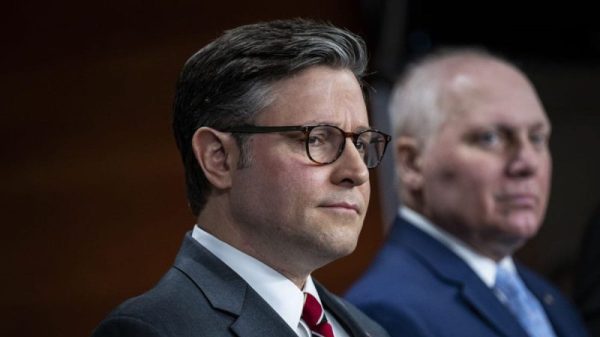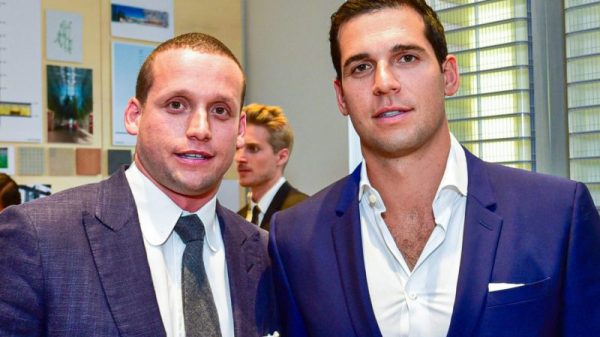Former president Donald Trump uses dehumanizing rhetoric to describe undocumented immigrants before largely White audiences. The runaway GOP polling leader says they are “poisoning the blood of our country” — comments some experts have compared to Adolf Hitler’s writings on blood purity.
Florida Gov. Ron DeSantis defended part of his state’s African American history curriculum standards that claimed some enslaved people developed skills that “could be applied for their personal benefit.”
And Nikki Haley omitted any mention of slavery when she was asked to explain the cause of the Civil War at a town hall event this past week. It wasn’t until the next day that Haley acknowledged the war was “about slavery.”
The Republican Party’s three leading presidential candidates are speaking about history and race in polarizing and provocative ways that sometimes diverge from or distort the facts, some political strategists, experts and civil rights leaders said. Their comments have stoked outrage among many Americans and risk alienating wide swaths of voters, including the independent and moderate voters who Haley has been courting, according to strategists in both parties.
But their rhetoric is also appealing to many Americans who lean conservative, interviews with voters in Iowa and New Hampshire show, including some who reject the accusations that the statements are racially insensitive or worse. Many in the GOP are resentful of liberal leaders who they see as constantly pointing out or forcing the country to apologize for past atrocities, and some are angry about demographic and cultural shifts in America driven in part by immigration.
“It’s part of this time warp that the Republican Party is in,” said Stuart Stevens, a former presidential campaign strategist for George W. Bush and Mitt Romney. He pointed to how Republican leaders targeted Colin Kaepernick, the biracial former NFL quarterback who took a knee during the national anthem to protest police brutality and social injustice, and tangled with NASCAR after it banned the Confederate flag at events.
“I think Republicans are still litigating a lot of these issues internally that the rest of the world long ago moved on from,” added Stevens. He added that they are catering to voters who “see the world changing and find it unsettling.”
But some conservative voters in the first two nominating states this past week expressed different views. Even as Haley’s comments stoked controversy around the country, many who attended her events in Iowa and New Hampshire said they took no issue with her initial answer that left out slavery.
Doug Vogel, 56, who attended a Friday event in Concord, N.H., said he thought concerns about Haley’s answer were overblown, and he thought she accurately addressed the legal concerns that were at play over states’ rights.
“She spoke the truth,” he said.
At a Haley town hall in Cedar Falls, Iowa, on Friday night, retiree Dorothy Fischer was more enthusiastic about Haley than ever after hearing her speak in person — and indignant at the firestorm over Haley’s explanation of the Civil War.
Fischer, a Republican who is eager for the party to move on from Trump, said the war wasn’t driven by slavery. “It was an economic battle” that pitted “southern plantation economics versus the northern industrial economics,” she said.
Her sister, Barbara Hatinger, who is also retired and Republican, agreed with the GOP candidates’ broader complaints about U.S. discourse on race: “The Democrats always want to play the victim card,” she said.
The 2024 Republican field at one point included a record six minorities, including Haley, who broke barriers as the country’s first female Asian American governor. Many in the GOP celebrated this diversity. But some Democrats have argued that the way the candidates have talked about racial issues has been problematic.
“When you think about Donald Trump, a man who is now parroting Hitler, talking about poisoning the blood of this country, when you think about Ron DeSantis who talked about slavery actually benefiting the slaves, this is just typical,” said Democratic National Committee Chairman Jaime Harrison.
Trump has rejected the comparisons to Hitler, and DeSantis has said the Florida curriculum — which also covers the horrors of slavery — is not meant to cast the institution in a positive light. But some experts have not been satisfied by their responses.
“The stock in trade of the GOP is evasion — Haley’s silence on slavery. And falsification — the Florida curriculum’s pretense that slavery had positive aspects,” said Amy Dru Stanley, a University of Chicago history professor. She added, “This false history plays into conspiracy theory. It damages efforts of racial reckoning and reconciliation.”
The pattern of Republican leaders inflaming the debate over racial issues has played out in countless ways after America’s conversation about race was thrust to the forefront by the election of Barack Obama as the nation’s first Black president. Trump — who built his political following in part by falsely suggesting that Obama was hiding his birth certificate — has largely shaped the party’s tactics.
Trump was elected in 2016 after harnessing the politics of White grievance and promising that the “silent majority” was back and was “going to take our country back.” In 2020, Trump showed that he was closely attuned to the backlash among some White voters to the cultural reckoning that took place following the death of George Floyd, a Black man, at the hands of a White Minneapolis police officer, who was later convicted of murder.
Amid that year’s debate about how to teach systemic racism in America in schools, Trump filled his 2020 campaign speeches with attacks on the movement to remove or replace monuments honoring Confederate generals. He accused an “unhinged left-wing mob” of trying to “vandalize our history, desecrate our monuments” and “demolish our heritage.” In 2021, Republican lawmakers in state legislatures across the country led campaigns against the teaching of critical race theory, an academic framework that holds that racism is systemic in America.
“Nixon said this stuff in private — we know from his tapes — and [George] Wallace said this stuff, and [Pat] Buchanan said this stuff. But I don’t think any presumptive presidential nominee has been so overt for a long time, at least some decades,” said Jennifer Hochschild, the H.L. Jayne Professor of Government, and Professor of African and African American Studies at Harvard University.
Trump is now reigniting themes he used to launch his 2016 campaign when he argued that undocumented immigrants were “rapists” who were bringing drugs and crime across the border into the United States.
Despite condemnation from historians and scholars who say Trump’s latest rhetoric is a clear echo of the “contamination of the blood” concept in Adolf Hitler’s antisemitic manifesto “Mein Kampf,” Trump has doubled down on his assertions that immigrants are “poisoning the blood” of this country as he promises to enlist the military in the “largest domestic deportation effort in American history.” Trump has denied that his statements are racist and continues to insist that he has never read “Mein Kampf.”
“What I’m saying when I talk about people coming into our country is they are destroying our country,” he told conservative broadcaster Hugh Hewitt when pressed on the topic in a recent interview.
GOP presidential candidate Vivek Ramaswamy, who has excited some voters in the base but remains a long shot, declared during a debate that “great replacement theory” — which holds that Jews, minorities and immigrants are attempting to replace White, native-born Americans through immigration and higher fertility rates — “is not some grand right-wing conspiracy theory, but a basic statement of the Democratic Party’s platform.”
The candidates’ rhetoric could come at a political price ten years after the Republican Party flirted with adopting a more inclusive message to bring more racial minorities into their party after the 2012 election. Some recent polling suggests Trump has made inroads with Black voters in key swing states because of dissatisfaction with President Biden’s policies — and Trump did make some gains with Hispanic voters in 2020, according to a Pew Research Center report. But the GOP’s focus on polarizing racial themes could alienate those same voters as the November election draws closer, strategists from both parties said.
Haley attracted widespread attention with her comments at a Wednesday night town hall in Berlin, N.H. She made no mention of slavery in her response to a questioner who wanted her to say what caused the Civil War. “What do you want me to say about slavery?” she asked when the attendee pressed the issue. The next day, after widespread criticism, Haley acknowledged that the war was indeed “about slavery” and said she didn’t mention it earlier because she thought it was a “given.”
Michael Steele, who is a former chairman of the Republican National Committee and is Black, said Haley missed a key opportunity at a moment when he believes Republican leaders should more forcefully address the racial tensions in this country and work with their political opponents to try to diminish them.
“She didn’t want to piss off White folks in Iowa,” Steele said bluntly, adding that her answer “did a great disservice as a presidential candidate.”
Several voters at Haley’s first town hall in Iowa this week, in Dubuque, brushed off the furor over her Civil War answer — sometimes taking greater offense to the question. Others said they hadn’t heard of the controversy.
“It’s unfortunate that she didn’t say slavery,” said Joe Stapf, a Republican retiree from Dubuque.
“It was a fundamental mistake … but everybody makes mistakes,” echoed his wife Eileen. Asked about broader backlash to some discussions of race, the Stapfs said racism is a problem and shouldn’t be ignored.
Dubuque has been plagued by some high-profile racist acts over the years, including cross burnings and a Ku Klux Klan rally in the 1990s, as well as more recent episodes involving racist language and imagery.
The Stapfs said they found Haley to be frank and direct in general and dismissed the Civil War query as, in Joe’s words, “a gotcha question.”
An independent voter who dislikes both DeSantis and Trump — but would back Haley over Biden in the general election — said she’s largely ignored the criticism of Haley’s Civil War comments, cynical about how they might be misconstrued.
“I’m sure somebody had to take a piece of whatever she said and blow it up,” said the woman, Barbara, who spoke on the condition that her full name not be used. Shown the full context of Haley’s answer, she indicated it didn’t bother her.
In New Hampshire, as Haley spoke at a brewery near ski resorts filled with vacationers from nearby Massachusetts, some in the audience said they disagreed with her original answer to the Civil War question.
“I think she slipped up,” said Shala Siddiqui, who added that slavery is an important concern for American society even today and shouldn’t be brushed aside or unmentioned.
Over her career, Haley has spoken in high-profile ways about race, particularly when she made the decision to remove the Confederate flag from the statehouse grounds in South Carolina after the racist massacre at a Black church in Charleston in 2015.
Her admirers describe it as a moment of political courage, and she was widely praised for focusing at that time on racial healing in her state. After the fatal shooting of Walter Scott, a Black man who was shot in the back by a police officer after a traffic stop in 2015, Haley signed a bill requiring law enforcement to wear body cameras.
Haley raised the Confederate flag episode unprompted in Iowa on Friday, describing her role as understanding the perspectives of both sides and seeking consensus.
“I knew 50 percent of South Carolinians saw the Confederate flag as heritage and tradition. The other 50 percent saw it as slavery and hate. My job wasn’t to judge either side. My job is to get them to see the best of themselves and go forward,” Haley said. “Leaders aren’t supposed to decide who’s right or wrong or good or bad. … What a leader does is know where people are, and communicate their way forward so that you can get to a better place.”
But her efforts to heal racial divides have not been a major focal point of her 2024 campaign. She launched her candidacy with a speech declaring that “America is not a racist country,” a blanket statement that critics who see systemic injustices have criticized.
Her answer to the Civil War question on Wednesday night in Berlin, N.H. drew attention to one of the central criticisms of her candidacy, which is her caution and her tendency to stay on script. “She’s a fear-driven candidate,” Republican strategist Mike Murphy said. “She’s so afraid of offending anybody in the base that she goes to the word-salad thing.”
The controversy also put new attention on Haley’s 2010 answer to a similar question. During a private conversation with two leaders of Confederate heritage groups, which later became public after it was posted online, she described the Civil War as a fight between “tradition” and “change.”
Former New Jersey governor Chris Christie, who is competing with Haley for moderate and independent voters in New Hampshire, seized on her 2010 comment, warning voters not to back someone who avoids speaking hard truths because they are “afraid of offending people who support Donald Trump.
“The Civil War was not a choice between change and tradition. It was a choice between right and wrong and that’s it. And we’ve got to stand on the side of right,” he said at his own town hall in Epping, N.H. on Thursday.
DeSantis, who is polling a distant second behind Trump in Iowa, has pushed back on some efforts to make amends for the ugliest chapters in the country’s racial history, which Republicans call misguided. He signed a Florida law in April of 2022 that barred teaching that an individual, by virtue of their race, “bears responsibility for … actions committed in the past by other members of the same race.” At the time, he said Florida would not “use your tax dollars to teach our kids to hate this country or to hate each other.”
The Florida governor this year defended new African American history standards in his state that said students should learn “how slaves developed skills which, in some instances, could be applied for their personal benefit,” while discussing how they did work ranging from farming to blacksmithing.
Many Black leaders and historians called the suggestion of a benefit to slavery offensive. DeSantis on Thursday said his critics — including Vice President Harris — had “bastardized” that section “to try to create a narrative.”
DeSantis has also faced criticism for mispronouncing Harris’s first name, a tactic many other Republicans have also adopted. Pressed by a reporter on why he consistently mispronounces Harris’s first name, DeSantis said on Thursday he didn’t think his pronunciation was very different.
Faulting Haley for bungling her answer about the Civil War, DeSantis said she had “some problems with some basic American history” and wasn’t “ready for prime time.”
Even before DeSantis began running for president, Black leaders protested what they viewed as his racially divisive tactics. The redistricting plan that he championed, which eliminated two districts that were drawn to ensure representation of Black voters, drew opposition even from members of DeSantis’ own party in the state legislature.
Black leaders balked not only at DeSantis’s efforts to restrict certain teachings about race, but also his push to halt funding for “diversity, equity and inclusion” training at state colleges.
When he attended the vigil in Jacksonville for victims killed in August by a White gunman who said he hated Black people, according to authorities, one man shouted at the governor: “You’re not welcome here!”
DeSantis, in his remarks, said it was “totally unacceptable” that the gunman had targeted people based on their race. He was praised by allies and some Democrats for appearing at an event attended by many who were likely to be critical of his policies.
Hannah Knowles reported from Iowa. Meryl Kornfield reported from New Hampshire.


































